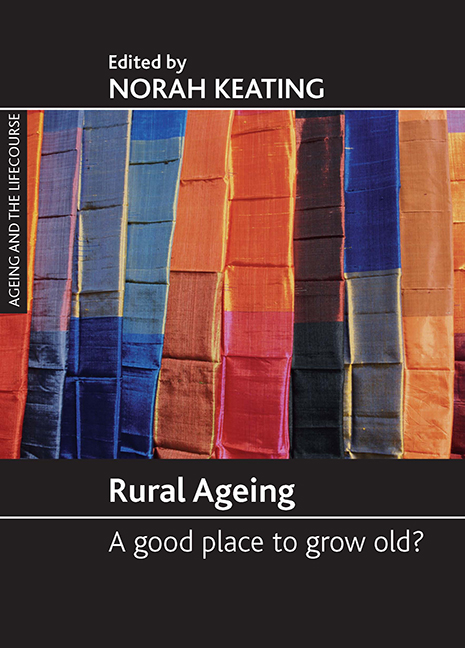Book contents
- Frontmatter
- Contents
- Foreword
- Acknowledgements
- Notes on contributors
- one A critical human ecology perspective on rural ageing
- two Crossing borders: lifecourse, rural ageing and disability
- three Rurality and ageing well: ‘a long time here’
- four The evolution of networks of rural older adults
- five Distance, privacy and independence: rural homecare
- six Respite for rural and remote caregivers
- seven Ageing, disability and participation
- eight Participation in rural contexts: community matters
- nine Staying connected: issues of mobility of older rural adults
- ten Ageing and social exclusion in rural communities
- eleven Age-friendly rural communities
- twelve Revisiting rural ageing
- References
- Index
- Other titles in the Ageing and the Lifecourse series
six - Respite for rural and remote caregivers
Published online by Cambridge University Press: 19 January 2022
- Frontmatter
- Contents
- Foreword
- Acknowledgements
- Notes on contributors
- one A critical human ecology perspective on rural ageing
- two Crossing borders: lifecourse, rural ageing and disability
- three Rurality and ageing well: ‘a long time here’
- four The evolution of networks of rural older adults
- five Distance, privacy and independence: rural homecare
- six Respite for rural and remote caregivers
- seven Ageing, disability and participation
- eight Participation in rural contexts: community matters
- nine Staying connected: issues of mobility of older rural adults
- ten Ageing and social exclusion in rural communities
- eleven Age-friendly rural communities
- twelve Revisiting rural ageing
- References
- Index
- Other titles in the Ageing and the Lifecourse series
Summary
Introduction
The complexity of the concept ‘rural’ is well recognised, whether the focus is on size, the sociocultural or the sociopolitical. Even size, arguably the easiest descriptor to deal with, eludes consensus; government definitions range from sizes of 300 to 300,000 (Woods, 2005). In addition, the traditional image of rural as a pastoral setting with conservative values, idyllic slower-paced lives, close-knit communities with flourishing family values and connection to land and locality has been replaced with an acknowledged heterogeneity among rural settings (Giarchi, 2006b). Many aspects of rural communities are now contentious. They vary in terms of distance from urban centres where some are so proximate that they are in the urban shadow; social support may be strong or the exodus of young people might leave a dearth of informal assistance; and longstanding land use and values might be stable or in flux, affected by immigration of both urbanites and mobile transients. Rural communities are undergoing fundamental shifts in their very nature (Woods, 2006).
A number of features nevertheless characterise this environment: small populations, low density of population, distance from urban centres, monetary and time costs for travel, and a relative lack of formal transportation, healthcare and other services (CIHI, 2006). The role of family supports is less clear because of contrasting images of rural settings as supportive and expressed concerns, especially for an older population, that the exodus of youth leaves behind a serious lack of family support. In this chapter, attention is directed towards an area of intersection of formal and informal care for older adults in rural areas through an examination of respite.
While the concept of respite is a professional term (Brody et al, 1989), the need for a break is one of caregivers’ most frequently expressed needs (Stoltz et al, 2004). Most of the research on caregiver respite has been conducted in urban settings although the concept is equally applicable in rural settings. Arguably, it is of greater importance in those rural settings where youth exodus has left behind fewer others to provide care for older adults. Three different rural regions in Canada offer insight into supporting caregivers in their individual and unique needs for a break in ways that caregivers themselves want. These communities offer innovative formal programmes that facilitate a break for caregivers.
- Type
- Chapter
- Information
- Rural AgeingA Good Place to Grow Old?, pp. 53 - 62Publisher: Bristol University PressPrint publication year: 2008



